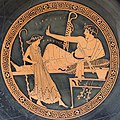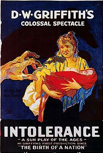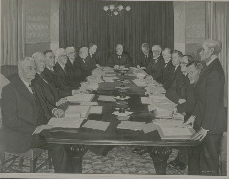The recent decision of Judge Colin Birss QC in Temple Island Collections Ltd v New English Teas Ltd & another [2012] EWPCC 1 has attracted a good deal of attention on the blogosphere and beyond in the way in which it has approached the scope of copyright protection which the creator of a photograph or digitally manipulated image might now expect to enjoy in the courts of England and Wales. Andy Johnstone authored a guest-note on this weblog here, while Catherine Lee provided this analysis for the IPKat and Rosie Burbidge has since posted her view of the ruling on Art & Artifice. Further comments come from ACID, NIPCLAW and beyond.
Month: January 2012
Nothing to fear from debating with extremists | Irish Examiner
Nothing to fear from debating with extremists
Friday, January 27, 2012
Rather than ban the debate or protest outside the venue, it is our duty to engage and challenge the likes of Nick Griffin, writes Emmanuelle Schön-Quinlivan …
I do not believe freedom of speech was at the heart of this dilemma. However, freedom of rebuttal was. Those who opposed Griffin’s talk aimed to impose their view of democracy to other staff and students, a view which does not allow certain elected representatives to be challenged systematically, coherently and calmly as they express extremist views. …
Debating will make no difference to staunch supporters on either side. But for those of us who sit quietly in the corner, who voted for another party in a previous election but were disillusioned and consider a bold move to a more radical party, debate is crucial.
Great op-ed by: Dr. Emmanuelle Schon-Quinlivan of UCC.
See also the Editorial in the same edition: Griffin ban – Free speech is important.
Law Student Colloquium and Brian Lenihan Memorial Address
 The fourth annual Law Student Colloquium will take place in the Graduates’ Memorial Building (map) and the Law School (map) Trinity College Dublin, on Saturday 4 February 2012.
The fourth annual Law Student Colloquium will take place in the Graduates’ Memorial Building (map) and the Law School (map) Trinity College Dublin, on Saturday 4 February 2012.
The Colloquium is organised by law students for law students; it has been an enormous success over the past three years; and it has been made possible by the kind sponsorship of Allen & Overy and William Fry. For all enquiries please contact the organisers by email.
The centrepiece of the Colloquium will be the First Annual Brian Lenihan Memorial Address, which will take place at 6pm in the Graduates’ Memorial Building that evening. The Address has been organized by the Colloquium committee in order to mark Mr Lenihan’s substantial contribution to Irish public life, his longstanding connection to the Law School as a student, scholar, and lecturer, and his recent tragic death. It is envisaged that this will be the keynote event of the Colloquium from this year on.
This year’s Address is to be delivered by Judge Bryan McMahon, recently retired from the Irish High Court. The title of the address is ‘Judging‘ and in it Judge McMahon will discuss the craft of judging as well as the role of the judge in a modern democracy, and share with his audience insights accumulated during a varied career as an academic, practitioner, and judge.…
Intolerance of intolerance, and threats to free speech
 In DW Griffith’s silent-era powerful – if flawed – classic movie, Intolerance (1916) (IMDB | wikipedia), the contemporary story of a poor young woman, separated by the intolerant prejudice of social reformers from her husband and baby, is interwoven with tales of intolerance from ancient Babylon, New Testament Judea, and Reformation France. These fables vividly warn of the dangers of intolerance. Two stories in today’s media demonstrate that intolerance of intolerance is simply intolerance, and is all the more dangerous for that.
In DW Griffith’s silent-era powerful – if flawed – classic movie, Intolerance (1916) (IMDB | wikipedia), the contemporary story of a poor young woman, separated by the intolerant prejudice of social reformers from her husband and baby, is interwoven with tales of intolerance from ancient Babylon, New Testament Judea, and Reformation France. These fables vividly warn of the dangers of intolerance. Two stories in today’s media demonstrate that intolerance of intolerance is simply intolerance, and is all the more dangerous for that.
UCC society withdraws Nick Griffin invite to ‘free speech’ debate
… In a statement this afternoon, the UCC Government and Politics Society said it had withdrawn the invitation as a result of submissions from University staff and Gardaí, who had outlined a “potential threat to the safety and welfare of our students and the general public”.
As with the earlier TCD debacle, this is as inevitable as it is dismaying.
…French Senate passes bill outlawing genocide denial
… France’s upper house of parliament approved a bill on Monday that would make it a criminal offence to deny genocide, legislation that has caused tension between Paris and Ankara. The bill, which was approved by the lower house in December, has triggered outrage in Turkey as it would include the 1915 mass killing of Armenians in Ottoman Turkey.
Letters of Note: Nothing good gets away (letter from Steinbeck to his son)
In November of 1958, John Steinbeck — the renowned author of, most notably, The Grapes of Wrath, East of Eden, and Of Mice and Men — received a letter from his eldest son, Thom, who was attending boarding school. In it, the teenager spoke of Susan, a young girl with whom he believed he had fallen in love.
Steinbeck replied the same day. His beautiful letter of advice can be enjoyed below.
French landmark case: A new dawn for investigative journalism? | Online Journalism Features | Journalism.co.uk
At the end of last year the French courts finally ended a long
running legal battle which saw an investigative journalist cleared
of defamation 10 years after he first reported on Clearstream, a
financial institution based in Luxembourg.
The landmark ruling stated that although the work of journalist
Denis Robert contained inaccuracies, the thoroughness of his
investigation and the public interest in the story outweighed the
defamatory claims.
The case has already been used as a legal precedent and could make
the work of investigative journalists in France and beyond much
easier.
h/t Kate Sutherland (@LawandLit) here
Is internet access a human right?
A recent United Nations Human Rights Council report examined the important question of whether internet access is a human right.
Whilst the Special Rapporteur’s conclusions are nuanced in respect of blocking sites or providing limited access, he is clear that restricting access completely will always be a breach of article 19 of the International Covenant on Civil and Political Rights, the right to freedom of expression.
But not everyone agrees with the United Nations’ conclusion. Vinton Cerf, a so-called “father of the internet” and a Vice-President at Google, argued in a New York Times editorial that internet access is not a human right:
The best way to characterize human rights is to identify the outcomes that we are trying to ensure. These include critical freedoms like freedom of speech and freedom of access to information — and those are not necessarily bound to any particular technology at any particular time. Indeed, even the United Nations report, which was widely hailed as declaring Internet access a human right, acknowledged that the Internet was valuable as a means to an end, not as an end in itself.
See also the excellent post by Paul Barnal:
First of all, and perhaps most importantly, I didn’t like the headline, which stated baldly and boldly that ‘Internet Access is not a Human Right’.
The Council of State and the recusal of judges
 Two very different stories in the media over the last few days have coalesced in my mind over the weekend. The first story is the announcement by the President of seven appointments to the Council of State. The second is the debate in the US about the recusal of Supreme Court Justices from forthcoming challenges to health care legislation.
Two very different stories in the media over the last few days have coalesced in my mind over the weekend. The first story is the announcement by the President of seven appointments to the Council of State. The second is the debate in the US about the recusal of Supreme Court Justices from forthcoming challenges to health care legislation.
The Council of State is established by Article 31 of the Constitution, and its primary role is “to aid and counsel the President”. The first meeting was convened by President Douglas Hyde on 8 January 1940, and a large painting of the event (pictured above left) by Simon Coleman hangs in Áras an Uachtaráin, in a reception room now called the Council of State Room. At the end of last week, the recently-elected President Michael D Higgins announced the appointment of Michael Farrell, Deirdre Heenan, Catherine McGuinness, Ruairí McKiernan, Sally Mulready, Gearóid Ó Tuathaigh, and Gerard Quinn to the Council.
Among the specific functions ascribed to the Council by the Constitution, Article 26.1.1 provides that the President may, after consultation with the Council of State, refer a Bill to the Supreme Court to determine whether the Bill is constitutional or not.…

